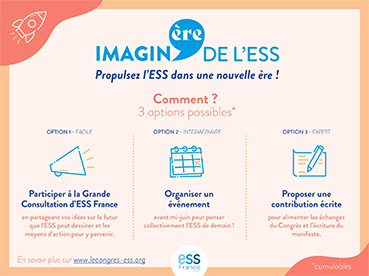Ahead of the SSE France Congress to be held on 12 and 13 June, the organisation representing the French social economy wishes to publish a manifesto detailing its collective roadmap for the development of the SSE. To achieve this, it has launched ‘Imagin’Ère de l’ESS’, an initiative inviting all those who work in SSE on a daily basis to contribute by reflecting on the next ten years, “to propel SSE into a new era”.
SSE is recognized in France by the Law of July 31, 2014. For ESS France, SSE constitutes “a dynamic based on inexhaustible energy: the power of action and the initiative of citizenship”. In December 2021, it initiated the Republic of SSE, enabling the affirmation of a political common ground and the reasons for action specific to its actors. Today, in 2024, ESS France asserts that significant achievements must be made in many sectors: food security, early childhood, social protection, biodiversity preservation, education, access to natural resources, etc. “Only a united SSE can meet these major challenges”.
Convinced of the importance of relying on a joint approach by all stakeholders, SSE France invites citizens, employees, managers, SSE leaders, civil servants and volunteers to reflect on the SSE of the next ten years.
There are three ways to get involved. For those who only want to spend a few minutes, a “Grande Consultation” has been created. If you would like to send in a general or specific proposal, you can send your contribution here (https://lecongres-ess.org/boite-a-outils/ ). And if you want to meet SSE actors and debate and exchange ideas, they can participate in one of the Imagin’Ère de l’ESS events currently being organized.
All information at: https://lecongres-ess.org/imagin-ere/







